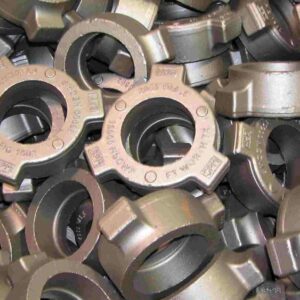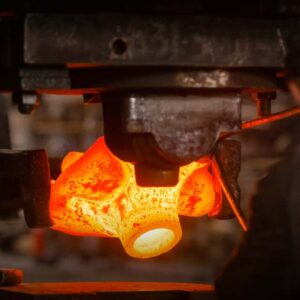Description
Food Processing Forgings
Introduction to Food Processing Forgings
In the food processing industry, where hygiene, strength, and durability are critical, forgings play an essential role in producing equipment and components that meet strict sanitary standards. Forgings for the food processing sector are typically made from high-quality stainless steel and other corrosion-resistant alloys to ensure that they can withstand the harsh environments, including high temperatures, moisture, and exposure to chemicals used in cleaning and sterilization processes.
Forged parts are preferred in food processing equipment due to their superior mechanical properties, cleanliness, and the ability to meet strict safety regulations. Forged components, ranging from blades and mixers to structural elements and fittings, are used across various food processing systems to ensure the consistent quality and safety of the products being manufactured.
What Are Food Processing Forgings?
Food processing forgings are components shaped under intense heat and pressure to form high-strength parts that can handle the rigors of the food industry. The forging process refines the grain structure of the metal, making it stronger, more durable, and resistant to wear and fatigue. This makes forgings ideal for food processing equipment that must operate continuously, endure mechanical stress, and resist corrosion caused by food products and cleaning chemicals.
The materials used for food processing forgings, such as stainless steel and other corrosion-resistant alloys, must meet FDA and NSF regulations to ensure they do not contaminate the food products being processed. These forgings are commonly found in machines that slice, dice, mix, transport, and package food products.
Benefits of Forgings in Food Processing Applications
- Hygiene and Cleanliness: Forged stainless steel components offer smooth surfaces that are easy to clean and sanitize, reducing the risk of contamination and making them suitable for food contact.
- Corrosion Resistance: Food processing environments expose equipment to moisture, acids, and cleaning chemicals. Forged stainless steel offers excellent resistance to corrosion, ensuring longevity and reducing the need for frequent replacement of components.
- Durability and Strength: Forgings provide superior mechanical strength and resistance to wear, which is crucial in equipment that must endure high loads, vibration, and repetitive motions.
- Customization: The forging process allows for precise control over the shape and dimensions of components, enabling manufacturers to produce custom parts that meet the exact requirements of food processing equipment.
- Compliance with Safety Standards: Food processing forgings are made from materials that comply with stringent health and safety standards, ensuring that they do not affect the quality or safety of the food products.
Applications of Food Processing Forgings
Forged components are used in a variety of food processing equipment, including:
- Blades and Cutters: Forged stainless steel blades are used in slicing, dicing, and cutting machines. These blades must maintain sharpness, resist corrosion, and be easily cleaned to ensure safe and efficient food preparation.
- Mixers and Agitators: Forgings are used in mixers and agitators to create robust components that can handle the mechanical stress of stirring and mixing food products.
- Conveyor Systems: Forged components such as gears, rollers, and shafts are integral parts of conveyor systems that transport food products through processing lines. These parts must be strong, durable, and resistant to corrosion.
- Valves and Fittings: Forged stainless steel valves and fittings are used in food processing systems to control the flow of liquids and gases. These parts must be resistant to corrosion and easily cleaned to prevent contamination.
- Packaging Equipment: Forged parts are used in machines that package food products, including sealing components and structural elements that must withstand the repetitive motions of packaging operations.
- Pumps and Flow Control: Pumps used to transport liquids, sauces, and semi-solid food products often rely on forged stainless steel components for their strength, durability, and corrosion resistance.
Common Grades of Forging Materials for Food Processing
Below is a table showcasing some of the common grades of materials used in food processing forgings, along with their key properties and applications:
| Material Grade | Material Type | Key Properties | Applications |
|---|---|---|---|
| 304 Stainless Steel | Austenitic Stainless Steel | Good corrosion resistance, easy to clean | Blades, cutters, mixers, agitators, valves, and fittings |
| 316 Stainless Steel | Austenitic Stainless Steel | Superior corrosion resistance, especially to acids | Pumps, mixers, valves, fittings, and structural components |
| 410 Stainless Steel | Martensitic Stainless Steel | High strength, good wear resistance | Blades, knives, and cutting tools |
| 17-4 PH Stainless Steel | Precipitation-Hardening Stainless Steel | High strength, corrosion resistance | Structural components, fasteners, and mixer shafts |
| Nitronic 60 | Austenitic Stainless Steel | Excellent wear and galling resistance | Valve components, pumps, and fittings |
| Duplex 2205 | Duplex Stainless Steel | High strength, excellent corrosion resistance to chlorides | High-stress food processing parts, structural components |
Why Choose Forged Components for Food Processing?
- Durability in Tough Environments: Food processing equipment must function in wet, acidic, and chemically-laden environments, and forged stainless steel components provide the durability needed to handle these conditions.
- Ensuring Food Safety: Forged components are typically smooth and free from imperfections, making them easy to clean and less likely to harbor bacteria, ensuring food safety.
- Compliance with Industry Standards: Forged food processing components are made from materials that comply with NSF, FDA, and other industry standards for food safety, ensuring that they are suitable for direct food contact.
- Long-Term Cost Efficiency: While forgings may have a higher upfront cost compared to other manufacturing processes, their durability and resistance to wear and corrosion make them a cost-effective option in the long run, as they reduce the need for frequent maintenance or replacement.
- Enhanced Mechanical Properties: Forged components exhibit superior mechanical properties such as strength, toughness, and fatigue resistance, making them ideal for parts that must handle repetitive motion and mechanical stress.
Conclusion
Food processing forgings are a critical component of modern food production, ensuring that equipment can withstand the rigorous demands of high-volume, high-stress processing environments while maintaining the hygiene and safety necessary to produce consumable products. Stainless steel and other alloy forgings provide unmatched strength, corrosion resistance, and durability, making them the go-to solution for blades, mixers, valves, pumps, and other vital parts in the food industry.
Choosing the right forging materials and working with a reliable manufacturer can help ensure the long-term success and efficiency of food processing operations, minimizing downtime and enhancing productivity. Whether you’re looking for custom blades, valves, or conveyor components, forged parts offer the reliability and performance that the food processing industry demands.






